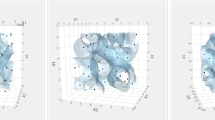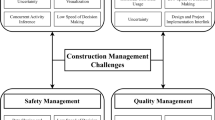Abstract
In this paper, we consider the monitoring and control of industrial projects that are performed by executing different activities within a given time duration. Hereby, it is desired to apply project control to each activity in order to avoid unexpected deviations in the project cost, respecting that the amount and cost of project control needs to be limited. We model the general setting of industrial project control as an optimal control problem with the goal of maximizing the cost reduction (savings) when applying control, while meeting constraints on the control effort. We then prove that it is optimal to apply a constant control effort to each activity during a given time duration. Consequently, we show that the exact optimal control solution can be obtained by nonlinear programming. We illustrate our results by an application example from the construction industry.






Similar content being viewed by others
Notes
Note: This proof is based on the existence (not computation) of \(\lambda \) and \(\mu \).
References
Acebes, F., Pajares, J., Galán, J. M., & López-Paredes, A. (2016). A project monitoring and control system using EVM and Monte Carlo simulation (pp. 31–40). Cham: Springer International Publishing.
Al Hamadi, H. M., Sangeetha, N., & Sivakumar, B. (2015). Optimal control of service parameter for a perishable inventory system maintained at service facility with impatient customers. Annals of Operations Research, 233(1), 3–23.
Azaron, A., Katagiri, H., & Sakawa, M. (2007). Time-cost trade-off via optimal control theory in Markov PERT networks. Annals of Operations Research, 150(1), 47–64.
Bertsekas, D. P. (2000). Dynamic programming and optimal control (3rd ed.). Nashua: Athena Scientific.
Byrd, R. H., Nocedal, J., & Waltz, R. A. (2006). Large-scale nonlinear optimization, Chapter KNITRO: An integrated package for nonlinear optimization (pp. 35–59). Berlin: Springer.
Cadenillas, A., & Huamán-Aguilar, R. (2016). Explicit formula for the optimal government debt ceiling. Annals of Operations Research, 247(2), 415–449.
Cerqueti, R., Marazzina, D., & Ventura, M. (2016). Optimal investment in research and development under uncertainty. Journal of Optimization Theory and Applications, 168(1), 296–309.
Chen, P.-H., & Weng, H. (2009). A two-phase GA model for resource-constrained project scheduling. Automation in Construction, 18(4), 485–498.
Colin, J., & Vanhoucke, M. (2015). Developing a framework for statistical process control approaches in project management. International Journal of Project Management, 33(6), 1289–1300.
Conway, B. A. (2012). A survey of methods available for the numerical optimization of continuous dynamic systems. Journal of Optimization Theory and Applications, 152(2), 271–306.
Ghoddousi, P., Eshtehardian, E., Jooybanpour, S., & Javanmardi, A. (2013). Multi-mode resource-constrained discrete time/cost-resource optimization in project scheduling using non-dominated sorting genetic algorithm. Automation in Construction, 30, 216–227.
Hazir, O. (2015). A review of analytical models, approaches and decision support tools in project monitoring and control. International Journal of Project Management, 33(4), 808–815.
Hazır, Ö., & Schmidt, K. W. (2013). An integrated scheduling and control model for multi-mode projects. Flexible Services and Manufacturing Journal, 25(1–2), 230–254.
Hazır, Ö., Schmidt, K.W., & Eryılmaz, U. (2014). An optimization model to coordinate scheduling and controling in projects: Case with instantaneous control constraints. In OPT-i, An international conference on engineering and applied sciences optimization.
Hazır, Ö., & Shtub, A. (2011). Effects of the information presentation format on project control. The Journal of the Operational Research Society, 62(12), 2157–2161.
Kogan, K., Raz, T., & Elitzur, R. (2002). Optimal control in homogeneous projects: Analytically solvable deterministic cases. IIE Transactions, 34(1), 63–75.
Meredith, J. R., & Mantel, S. J, Jr. (2011). Project management: A managerial approach. New York: Wiley.
Messica, A., Mehrez, A., & David, I. (2000). Optimal expenditure patterns of a double-path engineering project. Journal of Optimization Theory and Applications, 105(2), 441–455.
Mota, C. M. M., & de Almeida, A. T. (2012). A multicriteria decision model for assigning priority classes to activities in project management. Annals of Operations Research, 199(1), 361–372.
Raz, T., & Erel, E. (2000). Optimal timing of project control points. European Journal of Operational Research, 127(2), 252–261.
Sabeghi, N., Tareghian, H. R., Demeulemeester, E., & Taheri, H. (2015). Determining the timing of project control points using a facility location model and simulation. Computers and Operations Research, 61, 69–80.
Sethi, S., & Thompson, G. (2002). Optimal control theory: Applications to management science and economics (2nd ed.). Boston, MA: Kluwer Academic Publishers.
Shtub, A., Bard, J. F., & Globerson, S. (2005). Project management: Processes, methodologies, and economics. Upper Saddle River: Pearson Prentice-Hall.
Valian, H., Jafari, M. A., & Golmohammadi, D. (2016). Resource allocation with stochastic optimal control approach. Annals of Operations Research, 239(2), 625–641.
Wang, Y., Perkins, J. R., & Khurana, A. (2002). Optimal resource allocation in new product development projects: A control-theoretic approach. IEEE Transactions on Automatic Control, 47(8), 1267–1276.
Weglarz, J. (1981). Project scheduling with continuously-divisible, doubly constrained resources. Management Science, 27(9), 1040–1053.
Willems, L. L., & Vanhoucke, M. (2015). Classification of articles and journals on project control and earned value management. International Journal of Project Management, 33(7), 1610–1634.
Acknowledgements
This work was supported by the Scientific and Technological Research Council of Turkey (TÜBİTAK) under grant SOBAG 113K245. Oncu Hazir would like to thank for the support of the Science Academys Young Scientist Awards Program (BAGEP).
Author information
Authors and Affiliations
Corresponding author
Additional information
Publisher's Note
Springer Nature remains neutral with regard to jurisdictional claims in published maps and institutional affiliations.
This work was supported by the Scientific and Technological Research Council of Turkey (TÜBİTAK) under Grant SOBAG 113K245.
Rights and permissions
About this article
Cite this article
Schmidt, K.W., Hazır, Ö. Formulation and solution of an optimal control problem for industrial project control. Ann Oper Res 280, 337–350 (2019). https://doi.org/10.1007/s10479-019-03262-7
Published:
Issue Date:
DOI: https://doi.org/10.1007/s10479-019-03262-7




